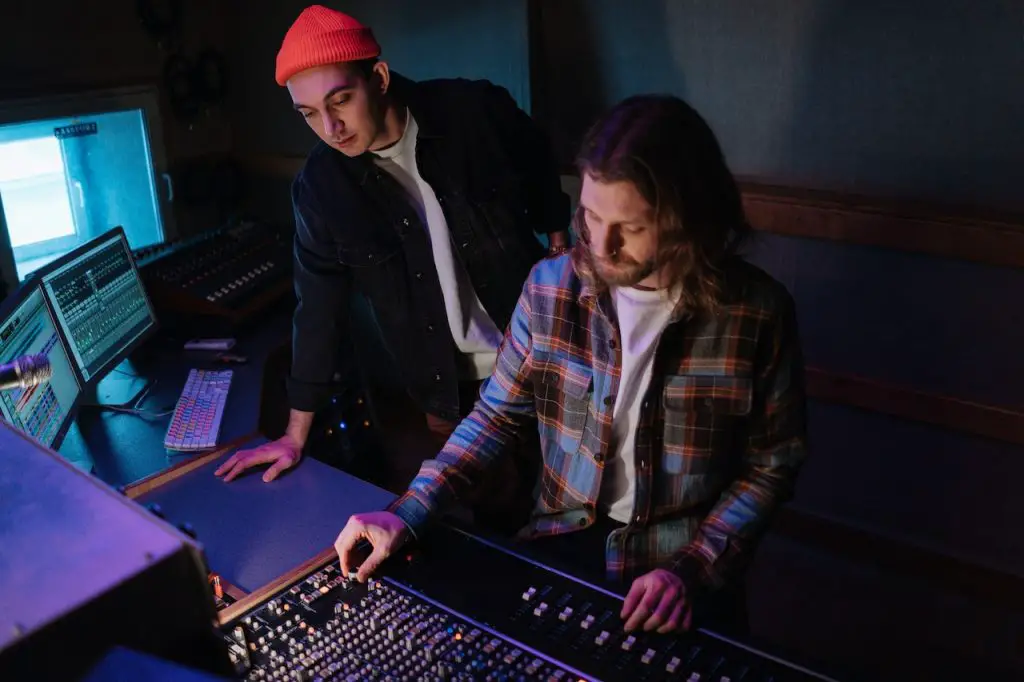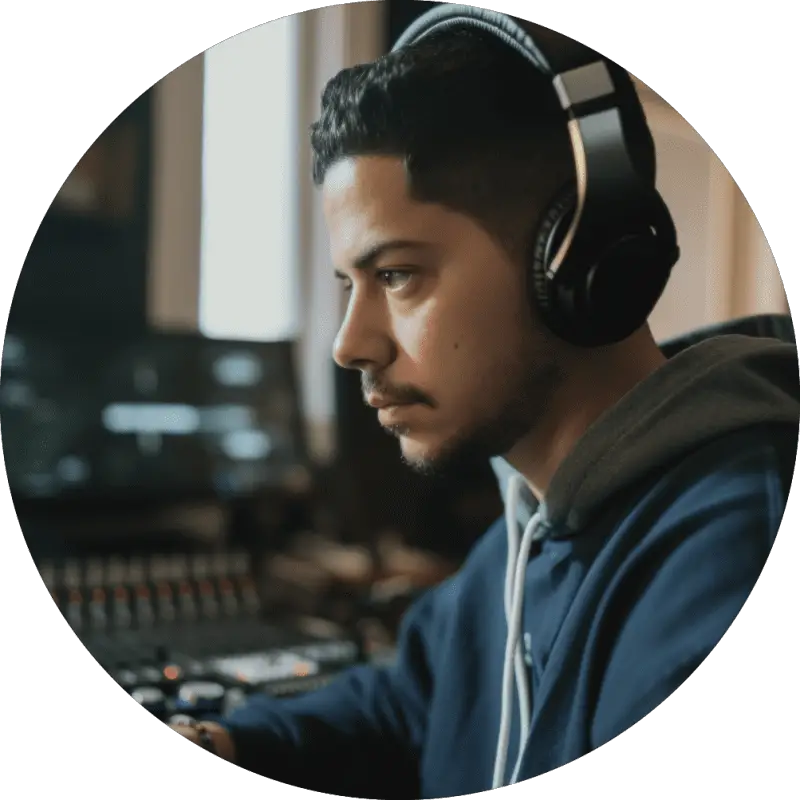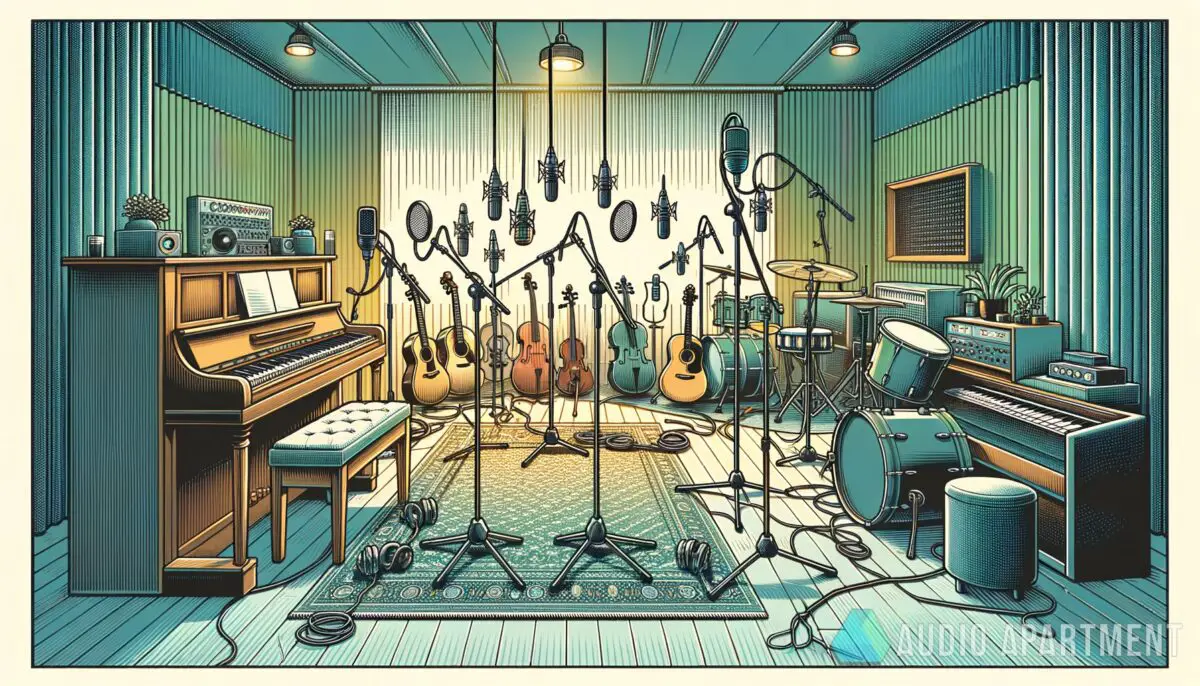If you’re a musician, you probably know that mixing and mastering are two important steps in producing effective music. But what’s the difference between mixing and mastering?
This article covers the differences between mixing and mastering music. We’ll also offer tips on how to mix and master music effectively so that your songs sound their best. So if you’re serious about your music career or are just curious about mixing and mastering, this post is for you!
What is the difference between mixing and mastering music? During mixing, an engineer edits and adjusts the volume levels of each track so that the finished product sounds excellent when all of the tracks are played together. Mastering is the process of putting the finishing touches on an album or single. It involves improving the sound quality, making sure the tracks sound the same, and getting the product ready to be sold.
What is mixing?
Mixing means putting together all the sounds from the different tracks and adjusting their volumes to make a single sound. A mixing engineer will also strike a balance between them in terms of panning or where in the stereo field they sit (left, center, right, or elsewhere).

They will also use depth to create a sense of space by making it seem like sounds are close together or far apart.
AKAI Professional MPK Mini MK3

AKAI Professional MPK Mini MK3
What is mastering?
In music production, “mastering” means the last step before release. By the time you get to mastering, you’ve already had extensive work done on the music after it’s been mixed. You just need to make a few more tweaks before releasing it or sending it back to the client. There are three main objectives in the process of mastery:
- Turn up the volume.
- Boost the audio file’s quality.
- Make sure the song is playable on any device.
The difference between mixing and mastering
When you combine different sounds through mixing, you make them more harmonious. Together, they become more cohesive. Mastering is the finishing touch. So, it is possible to mix without mastering, but it is not possible to master without mixing.
The goal of the mixing process is to better show how the artist wanted to make people feel in the first place.
Equalization is a goal of both the mixing and mastering processes. When mixing, you’re responsible for adjusting the volume of individual instruments. Mastering involves striking a balance between the whole song and the spectral material. Mastering improves a song by ensuring that all parts sound great together.
Massive mixing sessions are possible. For example, even a basic rock or pop arrangement may include 32 or more tracks, and the track count for more complicated productions may go into the hundreds. On the other hand, mastering sessions may have several stems for each song in addition to a stereo or multitrack file.
While mixing, you make many, sometimes drastic, changes to each track. Your modifications will not affect anything other than the target of your attention. On the other hand, mastering works on the whole song with wide, nuanced strokes.
The goal of the mixing process is to better show how the artist wanted to make people feel in the first place. On the other hand, mastering is all about sound quality. It makes the music sound as excellent as (or better than) any other version.
Tips on how to mix a song
Mixing a song is the process of blending different tracks of a recording to create a balanced and polished final product. Here are some tips to help you mix a song:
1. Check the file name
Once a consumer sends you a song, you should double-check the file names and extensions to ensure everything is in order.
2. Start the gain staging process
This involves changing each track’s levels to prepare for post-production. The gain staging process is an essential step in mixing audio to ensure the best possible sound quality.
3. Trim the frequencies
When I’ve gotten the song to this point—where it sounds good and balanced without any processing—I usually begin by trimming the frequencies of the elements in order.
There are two viable options here, and both of them are excellent. It is a matter of taste. Finish processing one track before moving on to the next, or equalize and compress every track, then modify it with other effects. Both approaches were tried and found to be successful.
4. Adjust the dynamics
After removing the “poor” frequencies, I generally adjust any shaky dynamics. The element’s frequency balance can’t be finished until some of the “good” frequencies are louder.
5. Listen to the final product
Test your mix in mono on multiple sound systems, mobile devices (phones, laptops, etc.), and so on. Once I’m happy with the mix, I usually return the track to the customer for final approval or send it to a mastering professional. Having another set of ears listen to the music is a good idea because it increases the likelihood that any mistakes will be noticed.
Tips on mastering a song
Mastering a song is the process of preparing a final mix for distribution, which involves optimizing the overall sound quality and ensuring that the mix sounds good on different playback systems. Here are some tips on how to master a song:
- Rest your ears often: When listening to the same piece of music repeatedly, it’s easy to get ear fatigue, so it’s essential to take regular breaks from your work to rest your ears.
- Limiting: Limiting is the process of making the mix louder, which is crucial to achieving a commercial level of loudness. A louder mix will sound more present and impactful. It’s recommended to limit the mix as loud as everything you hear on the radio.
- Use equalization: Equalization is a process of balancing the frequencies in a mix to ensure that all elements sound clear and present. Use Mid-Side Equalizer and subtractive equalization to reduce any unnecessary frequencies. Additionally, insert tape and/or tube emulation saturators to add warmth and depth to the mix.
- Compression: If needed, use compression either in stereo or multi-band form to control the dynamics of the mix. Compression can help to tighten up the mix and make it sound more cohesive.
- Try all three routes: You can do DIY mastering, hire a mastering engineer, or use online mastering services. Experiment with all three to determine which route works best for you and your music.
Mastering a song requires a combination of technical skills and creativity. It’s important to keep in mind that there is no one-size-fits-all approach to mastering a song, and the process may vary depending on the genre and style of music. It’s best to take the time to experiment and find the best techniques that work for you.

Importance of mixing and mastering music
When you mix and master your songs, you ensure they will sound their best across all playback systems, software, and hardware. People are likelier to skip your track if they hear clipping in the vocals or if the cymbals are too loud compared to the rest of the instruments.
A well-mixed and mastered song will have a professional sound that captures the listener’s attention. The mixing process ensures that all instruments are heard clearly and are balanced against each other, eliminating any unwanted noise or frequency clashes that could detract from the listener’s experience.
Mastering, on the other hand, produces a great sound across all listening systems, ensuring that the song sounds good regardless of where it is played, be it on the radio, in the car, or on a phone. It also brings the volume up to expected commercial levels, which is crucial for music to compete with other songs in the market.
Mixing and mastering are crucial processes in music production that enhance the overall sound quality of a song. It is vital to prioritize mixing and mastering to ensure that your music sounds professional and engaging to listeners.
If you want even more tips and insights, watch this video called “Difference between Mixing and Mastering Music” from the Major Mixing YouTube channel.
Frequently asked questions (FAQ)
Do you still have questions about the difference between mixing and mastering music? Below are some of the most commonly asked questions.
Is mixing easier than mastering?
Mixing is more difficult than mastering since there are more moving parts. However, that fact only makes it simpler than learning to play an instrument. Mastering and mixing are difficult tasks that take years to get good at, and even then, many engineers keep working to improve their skills.
Is mixing and mastering the same as producing?
Even though music producers can hire a professional mixing engineer to do the job, most choose to do it themselves. To sum up, mixing is only one component of the larger process of creating music, whereas producing refers to the overall endeavor.
How much does it cost to master a song?
Having your song mastered can cost anywhere from $50 to $200. However, it varies depending on the specific requirements of the client and the level of service offered by the company. It is recommended to research and compare different companies and their services to find the best option for your needs and budget.
What is the purpose of mastering?
As the last stage of post-production for audio, mastering is the process that brings everything together. Mastering is a process used to fine-tune a stereo mix to sound good on any device or format. In conventional mastering, equalization, compression, limiting, and stereo enhancement are commonplace.
How do you get professional sound in a mix?
Mixing your music to sound more like a commercial release is easier with the help of reference tracks. In verse, you should give the listener a sense of the relative narrowness of the mix. Then, for dramatic effect, there will be an expansive chorus. The drop or chorus should enter with more volume than the buildup or verse to have an impact.
Conclusion
There you have it— the differences between mixing and mastering music. I hope you’re not confused anymore! If you apply these tips, you will surely end up with great tracks that people will love to listen to. So remember to follow our suggestions in this article and track your success as a music producer or composer.
So, do you also mix and master your music? And did I cover everything you wanted to know? Let me know in the comments section below (I read and reply to every comment). If you found this article helpful, share it with a friend, and check out my full blog for more tips and tricks on music production. Thanks for reading, and never stop making music.
Key takeaways
This article covered the difference between mixing and mastering music. Here are some key takeaways:
- The mixing process involves blending all the recorded sounds from the various tracks and adjusting their volumes to create a cohesive whole.
- In music production, “mastering” means the last step before release.
- It is possible to mix without mastering, but it is impossible to master without mixing.
- Mixing and mastering are crucial processes in music production that enhance the overall sound quality of a song.















